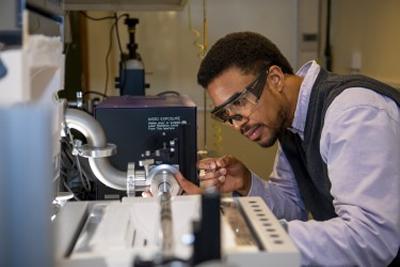Future Leaders Fellowship for disruptive materials research

All optical computing, next-generation memory technology, mobile phone batteries that could last a year, and discovering how the early universe was made. These transformative advances are among those a Southampton researcher is tackling through becoming the University’s next Future Leaders Fellow.
Dr Marcus Newton’s research will use a novel approach to X-ray imaging to look inside materials – specifically multifunctional ferroic materials, which have two or more functional properties.
The project is called TRIMM-3D, short for Time Resolved Imaging of Multifunctional Materials in Three Dimensions.
Dr Newton, Lecturer in Physics and Astronomy, said: “Multifunctional ferroic materials simultaneously exhibit more than one property, such as electricity, elasticity or magnetism. So, for example, if you apply an electric field it changes the magnetic properties.
“My expertise is in X-ray imaging at a microscopic scale – through that we can see what’s happening inside the materials, so we can learn about their behaviour at a very small scale. If you can see how atoms are moving, you can understand the process that’s going on and learn about the material’s behaviour. We have not had the tools to look inside these materials until now.”
Dr Newton will work with the Diamond Light Source synchrotron science facility in Oxfordshire.
One application of the research will be in non-volatile memories. A memory chip in a computer could be two orders or magnitude more energy efficient. Or a battery in a mobile phone built using these new materials could last a year.
The research could also prove revolutionary for astronomy. “Certain materials have structural defects that share the same symmetry as that of the early universe,” explained Dr Newton. “The image in 3D could tell us about the structure of the early universe – it could help cosmologists understand how the universe was made.”
He added: “The impact of this research is potentially enormous. It could be transformative in several areas.”
Dr Newton is the fourth researcher at the University to win a prestigious Future Leaders Fellowship from UKRI. His fellowship award is for £1,151,969.
“Winning the fellowship is a real boost for this research area which is relatively new, especially in the UK,” he said. “There is a lot of interest in it and the fellowship will propel my research forward.”
Dr Newton will recruit one post-doctoral researcher and a small team of PhD students to work on his four-year project, due to start in October.